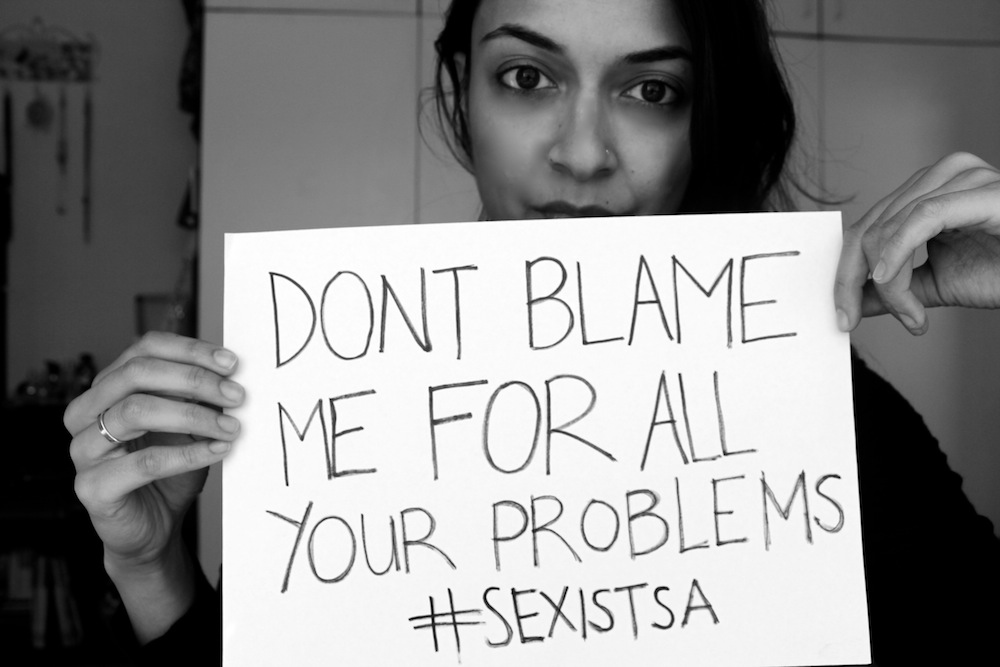I found myself nodding along to the Daily Vox editorial ‘Why we’ve had enough of this casual harassment’. I agree that there needs to be more conversation about the harassment women face in South Africa. And I thought perhaps I should discuss a little about what has been happening to me over the last few weeks.
Initially I was not open to discussing these events. I dismissed them as trivial and private, but as a friend pointed out, if you’re not willing to talk about your experience, how do you expect others to? This resonated with me and eventually spurred me to add my voice to the conversation.
Some years ago a schoolmate who I hadn’t seen since primary school contacted me to say he remembered me and was interested in pursuing a relationship with me. I politely declined and ignored his insistent and often alarming messages. Recently he started coming to my home, ringing the bell, taking photos and throwing ‘gifts’ over my gate. He has harassed me on social media and used my online images on his Twitter, Facebook and Instagram accounts. My requests for him to leave me alone were ignored. My threats to call the police were met with laughter.
I’ve blocked three of his numbers on my cell phone and also blocked him on all social media platforms and subsequently protected all my accounts. Despite these measures, after accidentally taking his calls from a new number, he claimed that I “was giving him mixed messages” and when I asked him how, he replied, “You know”.
A friend saw fit to tell me that I am being stalked “because you must have caused it and blame everyone else”.
All this because I said, “No”.
My experiences are not unique. These are experiences of women everywhere, all the time; at schools, at colleges at the workplace, on the street, and so on. It’s not about good looks or bad looks. It’s not about being young, or old. It’s about the inability to accept the word: “No.”
By no means is my experience a harsh one. It is certainly milder than the stories – that often go from digital, and emotional abuse to physical harassment.
But when you are harassed online, who do you turn to? Where is the recourse when so much of our lives are online?
And it seems that there is always a reason to abuse a woman. A friend of mine was called a slut and a loose woman with no morals, after she and her fiance broke off their engagement.
When I spoke up about the relentless stalking I was experiencing, I was told that I “must have caused the guy to stalk” me. Pray, tell, how do you “cause” a stalker?
The stalker himself, despite my determined efforts to deter him has had the temerity to say: “You’re giving mixed messages.”
And I think he actually means it. These men believe what they are saying because we live in a society where the default position is to blame the woman; even when passing the blame makes no sense.
The blame game
This belief that it is always the woman’s fault is so entrenched that even the woman begins to doubt herself. If she was harassed: she must have asked for it; if she was assaulted: she must have teased him and if she was raped, she must have been dressed inappropriately. The man in question need not take responsibility for his actions.
Many men in this country believe they have a right over women; it is as if they have been elevated to a stage above women that entitles them to do as they please.
The fact that South Africa has one of the highest rates of rape is proof of this attitude. So too, is the rate of absent fathers, with 9 million children growing up without their fathers (many leave when the woman falls pregnant).
Men get away with a lot in this country.
They are allowed to shout, scream and abuse because they are given space; he’s allowed to lose his temper or cheat or leave, because society accepts it. We are only conscientised to react to extreme violence.
A man gets to heap insults that are often malevolent, violent and condescending and that question a woman’s competence and sexuality with labels like “girl” and “slut”, and then after all that, he gets to blame her for the problem. So along with the trauma of the harassment, she also now has to deal with a flurry of insults that make her question who she is.
I thought these things that were happening to me were trivial, I thought they didn’t play into the bigger picture of harassment and assault. I initially thought that I didn’t need to share my experience because my situation was different. I thought I would be accused of bringing attention to myself.
But the truth is that the continuous tirade of abuse only illustrates how easy it is to suffer abuse, and how we allow it to fester. It’s happening all the time, yet we ignore it because we think it’s “trivial”. But it’s not.
It’s definitely time to start a serious conversation about why women have to constantly endure harassment of all kinds and why the blame is always ours. I am not going to stand for it. And you shouldn’t either.
And once we acknowledge it, half the battle is won.
Have you experienced harassment in your daily life? Tell us about it.


![Shubnum Khan sexistsa [resized]](https://www.thedailyvox.co.za/wp-content/uploads/2014/07/Shubnum-Khan-sexistsa-resized.jpg)








